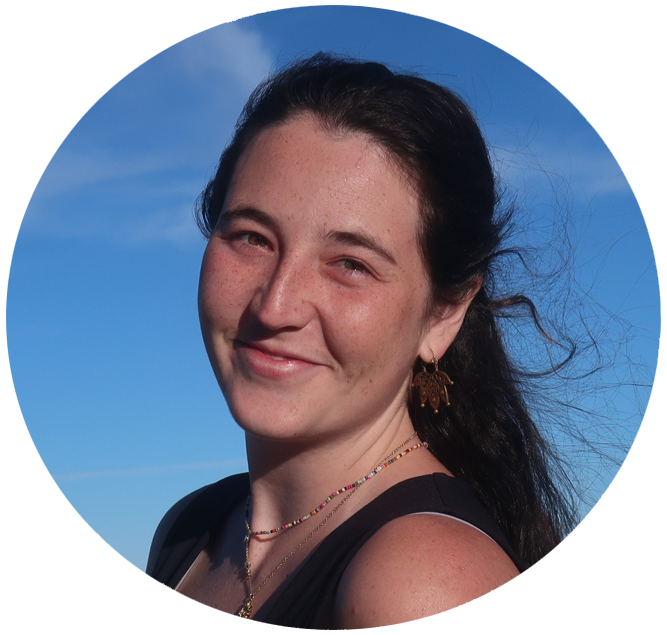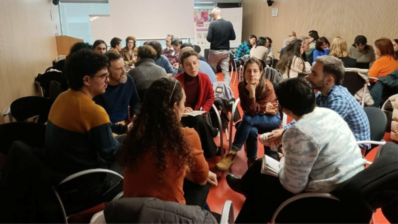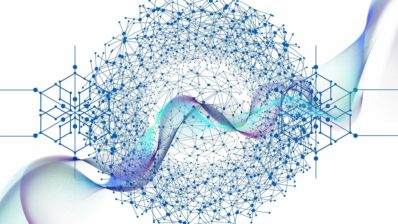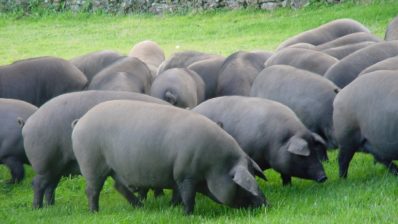Neurodivergence, including autism spectrum disorders (ASD), brings unique perspectives to the world of science. People with ASD, including those with Asperger’s syndrome, often excel at systematising. That is, analysing information according to rules and patterns. We spoke to David Aranda, a researcher at the G-protein-coupled receptor-based drug development lab at GRIB, to find out what science looks like from his perspective.
An early passion for science
As a child, David loved creatures, books describing animals, phylogeny and, at the age of 10, he knew practically all the phyla of the animal kingdom. Zoology was his refuge in high school, where he remembers being bored and unmotivated.
His way of understanding the world was marked by the need for clear structures. Social norms, metaphors and irony were enigmas that he learned to decipher as if they were subjects to be studied. He also remembers the difficulty of carrying out open-ended tasks, such as writing or drawing, if he did not have precise instructions. “If I don’t have a clear guideline, I can’t think,” he says matter-of-factly. But this need for order and definition eventually became one of his great strengths.
He was diagnosed with Asperger’s when he was 13, a moment he remembers as revelatory. It was a significant change, as “I stopped being weird and became somebody,” he says, describing how this label brought him a sense of calm and understanding about himself.
“I find it difficult to work without precises instructions. I work better with a clear guideline”
David Aranda (Hospital del Mar Research Institute)
The leap into bioinformatics
When the time came to choose a career, he opted for biotechnology because it sounded more interesting than biology. However, he soon discovered that the lab was not his strong suit: he was clumsy, broke tubes, contaminated plates… Experimental science seemed much more inaccurate than he might have thought at first. But, surprisingly, when the task involved applying formulas, performing statistical tests or doing a bit of programming, he found he was quite good at it.
It was a teacher who suggested to him that bioinformatics was a growing field, in high demand and understaffed. So, he decided to spend the summer learning to program while doing his final degree work. And suddenly, he discovered a new passion: “My brain is made for programming. I feel good doing it,” he explains. Finding a natural skill and, at the same time, enjoying it was a great personal reward.
That is why he did the master’s degree in bioinformatics at the UPF and joined the Barcelona Biomedical Research Park (PRBB) to do his final master’s thesis in the same laboratory where he is now doing his PhD, supervised by Jana Selent. He focuses on the GPCR family of proteins, membrane receptors that are key to the functioning of many biological functions.
The day-to-day life
His current research is easier for him than his master’s or bachelor’s degree, which were much more scattered than his doctoral work. After all, now he keeps to a timetable and focuses only on one topic. He confesses that this is ideal, as it allows him to organise his tasks in a methodical and efficient way.
“Thanks to my way of thinking, I am mentally organised. I get all the ideas and tasks in my head, organise them and divide them into mini-tasks to tackle them.”
David Aranda (Hospital del Mar Research Institute)
That does not mean, however, that everything is easy. One of the biggest surprises he has encountered in his career is the amount of writing involved in science. “They don’t prepare us for the amount of literary work involved. You have to write projects, articles, theses… You need to know how to write and communicate, and they don’t teach us that at university,” he explains. Moreover, the higher up the academic hierarchy you go, the more weight these tasks have, to the point where they become dominant in everyday life.
Despite these difficulties, his rigorous working method is a great ally. He has a unique ability to structure and break down the most complex tasks into small parts to get them done, which allows him to make steady progress. This organisation, coupled with his natural inclination for routines, gives him a great advantage. For example, when he has to create figures or graphs for scientific articles —a task he acknowledges as one of the most complicated for him— he follows a very clear process: he breaks down each step into small actions and asks his colleagues for feedback frequently. “They must be sick and tired of me asking them what they think is better or worse!”, says jokingly.
“To be alone in front of a screen all day… for me, that’s life! My brain is made for programming, and I feel good doing it”
David Aranda (Hospital del Mar Research Institute)
His day-to-day life is filled with hours in front of the computer, which is precisely what he is passionate about. “There are many people who say that they could never work in bioinformatics because it is a very solitary job, you don’t interact with people, you are alone in front of a screen all day… for me, that’s life!”. This way of working allows him to concentrate fully and work while listening to music, an environment he considers optimal. “I like that my job doesn’t involve interacting with other people, that I don’t have to see clients, or go to meetings, or interview people…” he explains. That’s not to say that he doesn’t enjoy the company of people and socialising with his colleagues, but he acknowledges that social interactions can be exhausting and prefers to keep them spaced out.
His way of thinking gives him an advantage at work, but it has also forced him to adapt to a world that is often unprepared for the needs of neurodivergent people. Still, he feels comfortable in his current environment, where the degree of adaptation he has to go through is low, he admits. As a wish, he says that “on an individual level, I would say that everyone should be more flexible with people who are like me, listen to us when we need something. That they don’t make fun of us because we act differently”.
There are many neurodivergent people involved in research. At PRBB, the BeyondAbility group works to ensure that disabilities are seen as a form of diversity rather than a limitation.
To all those neurodivergent people who love science, he advises them to go into it. “This is a world where there are more neurodivergent people than it may seem and that can be an advantage.” Science offers spaces where strengths can be highlighted, and the diversity of perspectives that neurodivergence brings can enrich the way questions are asked and problems are tackled. Still, it is an area that requires effort to adapt to. “It is important to adapt to the world because the world will not adapt to us,” he concludes realistically, but without losing the enthusiasm for research.







